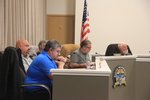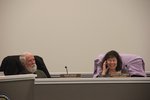

The Blaine Planning Commission approved a second public hearing on whether large manufactured home parks should be allowed in east Blaine. The public hearing is scheduled for the April 13 meeting.
The commission voted 4-1 during its February 9 meeting to reopen the public hearing after the commission failed to reach a consensus on their recommendation for Blaine City Council. Some commissioners asked for a second public hearing because they wanted to discuss more research they did after the December 8 hearing.
About 20 audience members listened intently to the commissioners’ debate, which lasted over an hour. Remote participants, including commissioner Jessica Stone, were unable to join the meeting due to technical difficulties.
The manufactured home park debate began last year when east Blaine developers Skip and Katie Jansen asked city staff to change the city’s zoning code to allow manufactured home parks in east Blaine planned unit developments (PUDs), which are five acres or larger. Currently, the city’s zoning code allows for manufactured homes in east Blaine in areas less than five acres. The city’s planned residential zone runs east of 15th Street to city limits and from the U.S./Canada border to H Street Road.
The Jansens’ next development East Harbor Hills, where they are considering a manufactured home park, is still a ways out from having city council consider its approval. East Harbor Hills will be between The Ridge at Harbor Hills and Grandis Pond.
After several delays, planning commission held a heated public hearing on the issue December 8. Commissioners then tabled the vote so they could do more research after more than a dozen east Blaine residents raised concern on the zoning change. Unmanaged large-scale development, affordability and impact on water supply, schools and the environment were some of the public’s top concerns.
Commission discussion
Commissioner Kevin Owens started the discussion by commenting on how he believed a lot of the opposition in December was to the East Harbor Hills development and not the zoning code change. He questioned people’s concerns that manufactured homes wouldn’t provide affordable housing. Concerns during the last meeting focused on families not being able to build equity and seniors being priced out due to fixed incomes.
“If it can be substantiated, then manufactured housing communities do provide an opportunity for affordable housing,” Owens said during the meeting. “We better think long and hard about turning that down.”
Owens continued, “We have ourselves a problem in the city of Blaine in that we don’t have much affordable housing and we don’t have very much rental housing available. We’re trying to attract businesses to come into our community and yet we can’t land those business tenants because the people who would work in those businesses can’t afford it.”
Owens said he started to do research after the December meeting but meeting procedures wouldn’t allow him to share those findings with the fellow commissioners unless another public hearing was opened. He proposed a motion to reopen the public hearing but discussion sidelined the motion.
Commissioner Jerry Marczynski recommended denying the request and asked planning commission to consider eliminating manufactured home parks from all areas of Blaine, not just east Blaine, because it didn’t seem like a good path for homeownership. He believed the current east Blaine zoning code was made deliberately to restrict large manufactured home parks.
Owens said they needed to focus on the proposed text amendment so they could give an answer to the developers.
Commissioner James Bring questioned whether it was beyond the planning commission’s scope to say what is or isn’t a good investment for residents.
“We’re not the financial police,” Bring said. “I don’t know if that’s within our wheelhouse of what we should be discussing – protecting people from their own investments.”
Commission chair Calvin Armerding said he couldn’t give Bring an answer, to which Owens suggested it may not be within the planning commission’s scope, but it might be within the purview of city council.
“I don’t think it’s beyond the scope of the city of Blaine to help find solutions to a problem,” Owens said. “The city of Blaine has a problem with affordable housing, therefore the city of Blaine has a responsibility to address that problem.”
Commissioner Jennifer Plombon argued it would be way beyond the city’s scope. She said the city couldn’t dictate whether residents were allowed to own the land under their manufactured homes and it was unreasonable to hope the city would find a nonprofit to make the manufactured home more affordable as had been suggested. Armerding believed planning commission could recommend city council approve allowing large manufactured home parks when the commission saw both benefits and disadvantages, and planning commission could recommend city council only approve the text amendment if the city took action to mitigate the problems.
“We could recommend adoption and city council could say flat-out ‘no.’ We could recommend rejection and city council could say, ‘Nope, we’re going to allow it.’ Or we could come in with a balanced approach as a third option and say, ‘Here are the things that we see could be problems and we think they need to be addressed before this is put into law,’” Armerding said.
Bring said his family grew up in trailer parks and were either able to move on from trailer parks or still live in retirement parks.
“We’re taking liberties into assuming people who would move into this park would be in financial ruin and need us to save them from themselves,” Bring said, later adding, “Meanwhile, it may be the only thing you and your family can afford at the time and you made the decision of, ‘Do we go this route here or do the five of us stay in this two-bedroom apartment?’”
Owens said his fear was the increasing trend across the U.S. of large investment companies purchasing manufactured home parks.
Community development services director Stacie Pratschner advised commissioners on their options. She said commission could deny the request to amend the code, reject the request and propose striking any ability to have any manufactured homes in the planned residential zone, or vote on the request and then ask council to prioritize looking at manufactured homes throughout the city.
Commissioners struggled to reach a consensus and three separate motions failed to reach a majority.
Plombon said she was against changing the code because she didn’t see manufactured home parks as the only means for affordable housing, which erupted the audience in an applause.
Marczynski ended the back-and-forth meeting by making a motion to hold another public hearing April 13, because he would be in Texas during the March meeting and couldn’t attend by Zoom. Commissioners approved the motion 4-1 with Bring in opposition. Stone was absent and commissioner Colin Hawkins, who was appointed after the December meeting, abstained.
Pratschner recommended the public submit their testimony after the public hearing notice was distributed so it could be included in the official public comment.
Public response
East Blaine resident Shanna Leeland said she’s not against development, but she is against the idea that manufactured home parks allow investors to charge monthly rent to a large group of tenants.
“Changing the zoning is counterintuitive because it is presented in that it will improve the affordable housing shares in Blaine but, historically, when you look at mobile home parks, they are not affordable housing solutions,” Leeland said. “It’s a juxtaposition of trying to create a solution but you’re actually creating a problem.”
Leeland said she believes the parks could be affordable if the developer sold individual lots for people to put manufactured homes on or if the developer sold the lots and homes as an affordable packaged deal. Leeland also supported co-op housing, where the homeowners hold a share of the park. The city may be able to incentivize both options but ultimately can’t control what the developer does in a free market, she said.
Leeland added that she was disappointed because the February meeting wouldn’t have been needed if some of the commissioners had done their homework before the December meeting. Leeland prepared a 20-page report on the problems with manufactured home park investments and distributed it to city staff and planning commission in September.
“The people I know who came to the meeting aren’t antidevelopment,” Leeland said. “They’re, ‘Let’s make sure the development aligns with things that are good for Blaine.’”
The Jansens did not attend the meeting. Cascade Engineering Group principal engineer Craig Parkinson, who represents the developers, did not respond to a request for comment by press time.
2 comments on this item Please log in to comment by clicking here
DaveJohnson
I would hope the City Counsel does it's home work looking into what the responsibilities of what the Mobil home parks rules and regulations.
Not just the care and upkeep of the park.
But most important is the residents rights!
If the park charges $600 per month per residents and there are 100 homes.
That's $720,000 per year.
Quite a few Mobil home parks become Trash Parks due to bad maintenance and upkeep.
Rules need to be put into place safe guarding that these things don't happen and it just becomes a CASH COW for the owners and that new owners don't have to fallow the rules and guidelines of the old owners.
Thursday, February 16, 2023 Report this
Paul_Schissler
Resident Owned Communities USA has many examples of parks that work well. Check them out at rocusa dot org
In a resident owned community, the homeowners own the shares of a nonprofit co-op corporation that owns the entire park. The co-op charges collects a monthly fee for a break-even budget. ROC USA offers help in our region through the ROC Northwest project, based at the Northwest Co-operative Development Center. rocnorthwest dot com
A park in east Blaine could be resident owned, especially if the City helped to make the land permanently affordable.
Tuesday, February 21, 2023 Report this